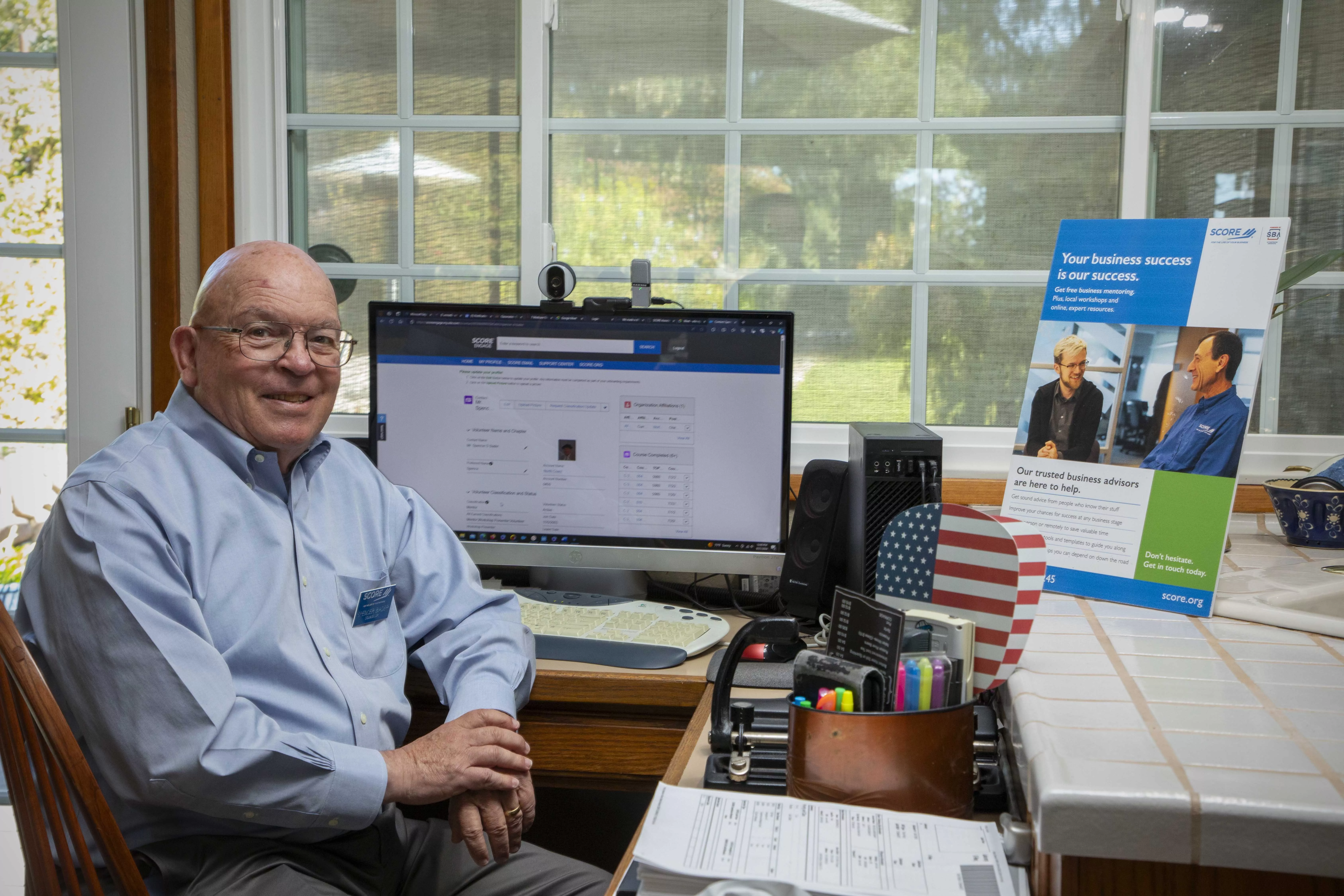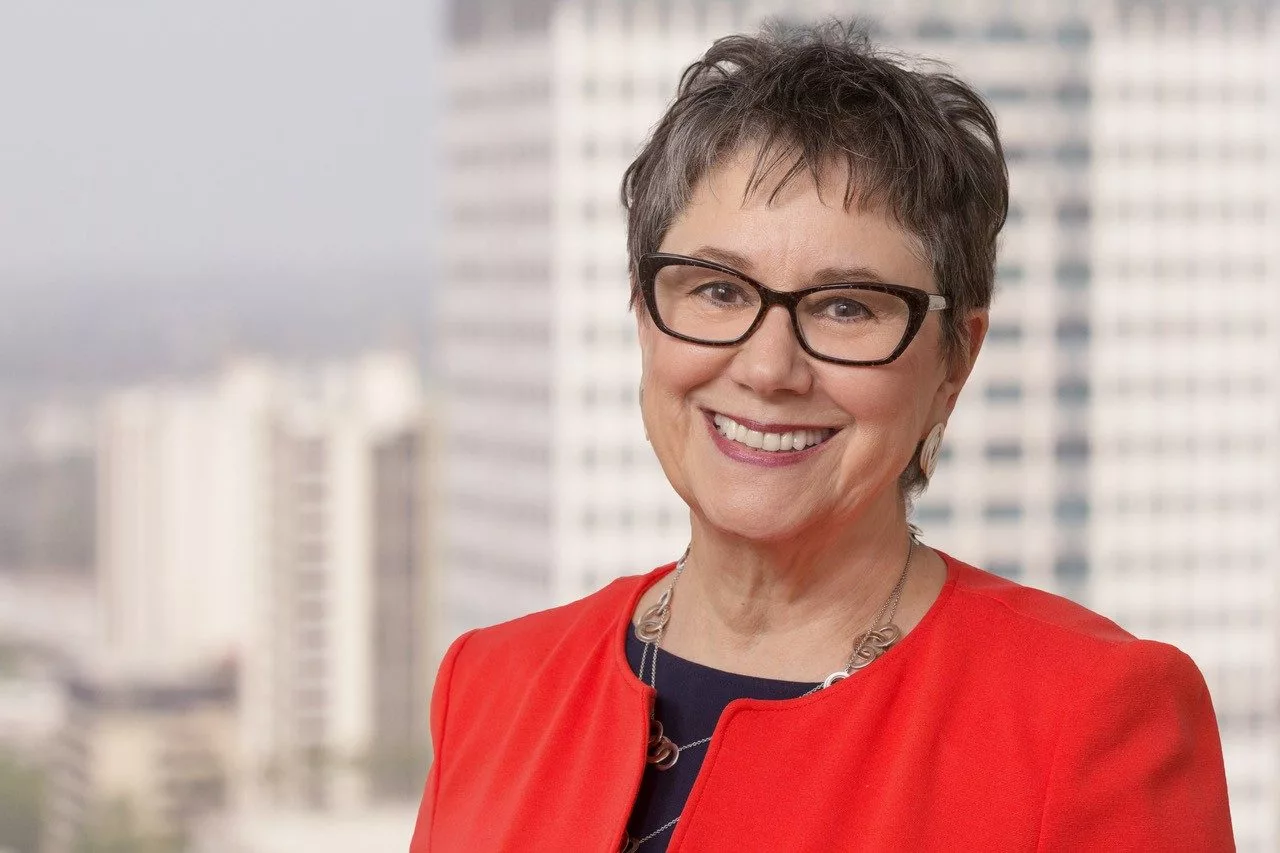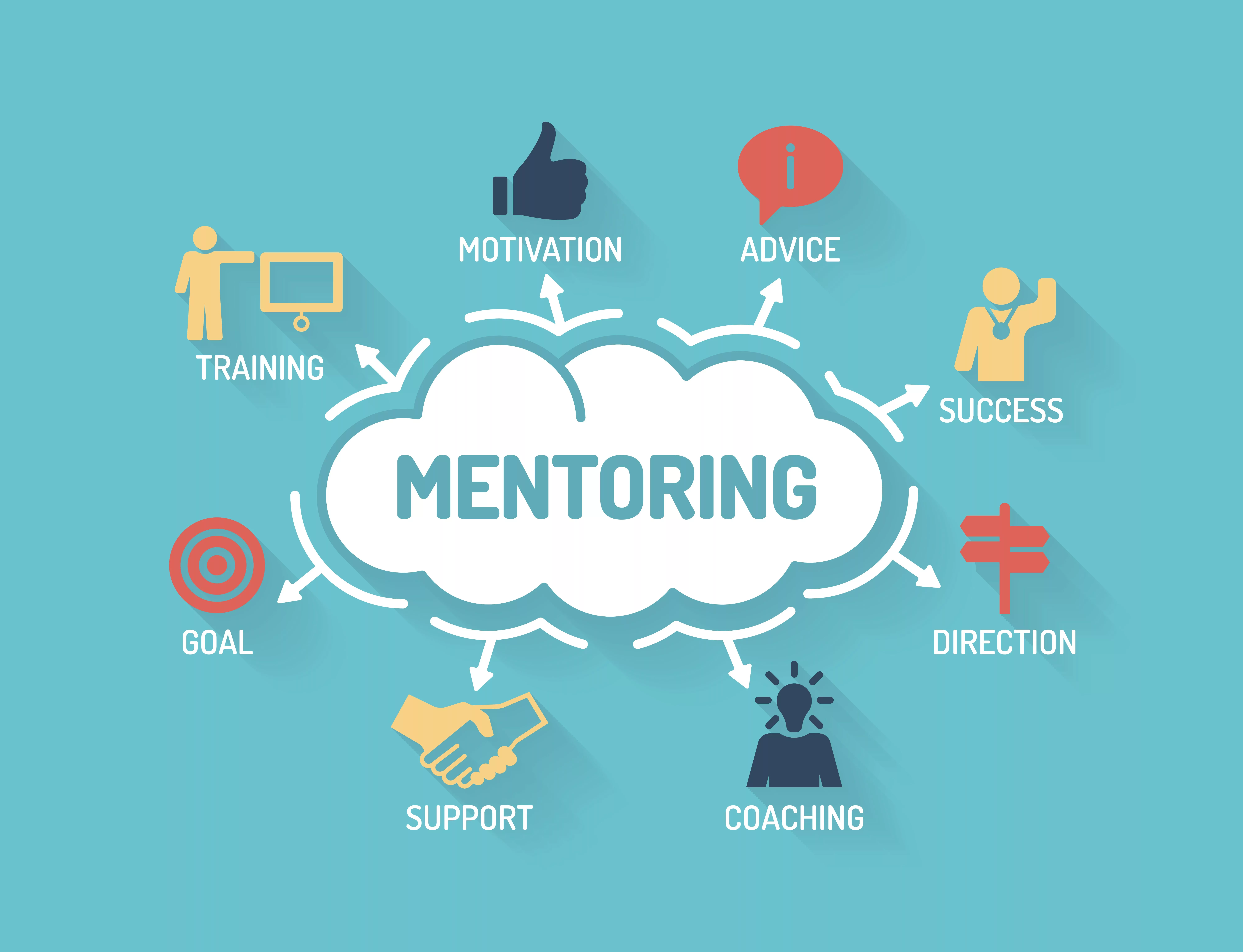
The U.S. Small Business Administration launched the Service Corps of Retired Executives (SCORE) business-mentorship nonprofit 60 years ago.
“I consistently tell people that SCORE has been the best thing I’ve ever done,” says Jim Kane, who retired 11 years ago after an impressive career working for––among others––U.S. Steel, Westinghouse, and Optical Coating Laboratory. Upon retirement in Santa Rosa, Kane signed up for a stint volunteering for SCORE (once called the Service Corps of Retired Executives), where he shares his years of experience in engineering and supply chain management as a mentor helping entrepreneurs and others to start a business, grow a business or exit a business.
“When I retired I needed something to keep me active and engaged,” he adds. “I’m a natural recluse, but I didn’t want to fall into a hole and close it behind me. I was intrigued by the work being done by SCORE, helping people who want to help themselves, and it’s been very rewarding for me.”

SCORE’s North Bay service area includes the counties of Sonoma, Napa, Lake, Mendocino and Humboldt, says Bader. “Basically, we cover northern California to the Oregon border.” The organization once had an office in the federal building in downtown Santa Rosa, but they gave it up, he says, due to strict security requirements which were burdensome to clients, as well as what he describes as “poor parking options.”
He says most SCORE mentors consult with clients––those seeking business advice and guidance––face to face in coffee shops or similar settings, or they talk via email, phone or through Zoom sessions. “Chambers of commerce are one source of referrals for sending clients our way, and sometimes the chambers let us use their facilities for meetings, too.”
Reaching out for expert help
Bader explains that most clients learn about SCORE through referrals from the U.S. Small Business Administration (SBA), which launched SCORE as a nonprofit 60 years ago. “We also have clients who find us through online searches, and also word-of-mouth from friends and family.”
When a prospective client reaches out to SCORE, they are assigned to a specific mentor who has the job experience that best matches their goals and ambitions. “In just two years I’ve had sessions with 38 clients,” says Karen Shapiro, who in 2018 sold her share in a company that specialized in retirement plans for small businesses. “I ran marketing and sales for my company and had a lot of contact with financial advisors and business owners. When I sold it, I missed the creative business problem-solving. So being a SCORE mentor has been a great way to keep my brain working. I’m loving it. I keep learning, and every situation is new.”

Bader sees about two new clients per month, plus the clients he continues to communicate with. “Some of them I’ve been assisting for more than six years,” he says. “A lot of people are exploring the idea of starting a business, so we have one session. Sometimes they go ahead on their own without our help or they don’t follow through with starting their business. We never tell anyone they shouldn’t start a business, but we try to help them reach that conclusion on their own if they don’t have the resources or the business background to make it successful.”
SCORE mentors are forbidden from giving legal advice to clients, and there are no grants or funding for clients who are short of money. “Our code of ethics prohibits us from being on the board of directors of client companies, investing in their companies or being paid by our clients. We don’t even allow them to buy us a cup of coffee,” says Bader.
“We work with them to develop a business plan and create a financial plan for their start-up year, and also a cash flow plan. This way they see how much money they need and will have to borrow.”
Scoring a bank loan
Locally, SCORE recently developed a partnership with the Sonoma Small Business Development Center (SBDC) in downtown Santa Rosa, which is another SBA program. “They have paid employees who do counseling and mentoring with our clients who are ready to get a bank loan, and then connect them with bankers who may be interested in making them a loan,” says Bader. “The SBDC refers people to SCORE first and then we turn them back over when they are ready to seek that loan. It’s a promising new development in the way we attract clients and get referrals of clients. It makes the two programs mesh together nicely and ultimately makes us both more effective.”
SCORE also uses local subject matter experts (SMEs) for specific needs when called for. This includes an attorney who specializes in nonprofit law and small-business law who meets with SCORE clients for a free 45-minute introductory session. Another SME is a search engine optimization expert who can help clients develop and create websites.
SCORE mentoring and the work of the SMEs is all free and totally confidential, explains Bader. “I may give some clients the same advice and resources, but I don’t discuss one client with another. That’s a fundamental part of our ethics of confidentiality.”
Co-mentoring and camaraderie
One mentor still works part-time in the local wine industry but has assisted approximately 50 SCORE clients in less than four years. “If you need to sell something, I’m your gal,” says Nancy Woods, who has worked in wine sales and marketing for decades, including managing tasting rooms and running wine clubs. Her retail experience goes back to when she was young and her father owned three sports shops. “That’s how I got started in retail work, it’s been my life. My husband once said to me, ‘You can’t take all this business knowledge with you, so why not help small-business people?’ As a SCORE mentor, I’m an extra person for clients to bounce ideas off of.”
Woods helps her clients in securing loans and writing business plans, among other duties. “And my favorite is coming up with a three-year cash flow plan for them. They need to know the numbers, and they have to think of everything, including what their monthly utility bills will be and the cost of insurance.”
Shapiro points out the great camaraderie that exists between SCORE mentors, with many of them co-mentoring clients because their business expertise covers multiple fields. “In addition to the creative problem-solving aspect, one thing I wasn’t expecting was how much I would enjoy working with other mentors to help one client,” she says. “We each have our own ideas and that makes it more helpful for the client. They can always use more sounding boards.”

Another change in SCORE operations has been to move away from maintaining separate chapters around the country. “SCORE is reinventing itself so it’s easier for clients to work with mentors from any area of the nation, to help clients anywhere in the nation,” says Kane. “With all the ways to communicate now, it’s great to match up mentors with special expertise, no matter where they are, to clients in need of that expertise. It’s all about the client and what we can do for them.”
Bader says he recently had an inquiry from a wedding photographer who was seeking mentoring. “There was no mentor here locally with experience with weddings, so we recommended a mentor in upstate New York who had that kind of experience.”
Going in the other direction, Woods was recommended as a mentor to a SCORE client in Maryland needing help with marketing wine. “I also worked with two guys in New York who were making wine in their garage and wanted to start a brand,” she says.
What do SCORE clients say?
David Bailey learned about SCORE from a simple online search. “At the time I was looking for engineering and product-development experience, and I got lucky with whatever rabbit hole I went down.”
Bailey is a certified compost-operations manager and member of the U.S. Composting Council. He founded California Compost, based in Petaluma, focused on food-waste recycling with a low environmental impact, and has been a SCORE client since before the pandemic.
“There are two benefits about SCORE that stand out above the rest,” he says. “First, the ability to talk with a subject matter expert when developing a product has been wonderful. Second, my SCORE counselor gives advice and is able to call in additional resources without any ulterior motives. This is like having a consultant for your business and other consultants to help when the need arises.”

He believes aspiring entrepreneurs would find SCORE mentors and resources “the best return-on-investment for your effort and time.” The SCORE team, he adds, is smart, experienced and on your side. “It’s a situation where you get back so much more than you can imagine. And it doesn’t matter what stage [of business] you are in, they have mentors to help.”
SCORE, he says, provides a human experience to the business environment, which is sometimes forgotten in the drive for profits and sales. “I haven’t met one SCORE counselor I didn’t like, and I can’t speak highly enough about my main business advisor, Jim Kane. SCORE is a special program with special people.”
Tanner Relyea, owner of Wolfard Glassblowing in Cotati, had mentors in the past for other reasons, he says, so he thought he should have a business mentor, too. “I was looking to start a business, but I’m an artist. I know how to make stuff, but didn’t know the business nuts and bolts to make it work.”
Relyea learned about SCORE through an online search, sent off an email inquiry about three years ago, and heard back promptly from Jim Kane, who he says was enthusiastic about helping him. “And we really hit it off.”
Getting the young artist’s new business off the ground was going slowly when he began meeting regularly with Kane. Then he had the opportunity to buy and take over operations at Wolfard, where he’d been working for eight years. “So I bought a business with 50 years of history, including its own retail shop many years ago in Montgomery Village.”
Today, the company doesn’t have a brick-and-mortar store, but 60% of its sales are direct-to-consumer through its website. The remaining 40% are to wholesalers. “Sales and marketing hadn’t been [Kane’s] expertise in his working life, but through a network of mentors he brought in big hitters with that experience,” says Relyea, who meets with Kane for an hour or two every other week, on average. “What I get from these meetings is to look at the nitty-gritty of my daily business operations and how to continually move in the right direction. We have now modernized the company and have doubled our profits.”
Relyea praises SCORE for the expert team of mentors who have helped him. “Nobody cares about my business as much as I do, but [Kane] is a close second. I tell people I know who I think would benefit from SCORE mentoring to reach out to them for assistance. But there can be a sense of ego that stops people from doing that. Yet, a SCORE mentor will be the second person right behind you that cares about making your business successful. My advice to others is to use all the systems at your fingertips that can help you succeed. When I get my business to a place that’s more stable, I’d love to be a SCORE mentor myself.”
New mentors welcome
Woods says SCORE is always looking for more mentors––“anyone who wants to share their business knowledge,” she adds.
Kane agrees. “I always explain to new counselors that you may not know everything about running a business, but you’ll be surprised at how much you do know for helping people who don’t know anything about starting and operating a business. That’s not a comment on their intelligence, they just don’t have the experience. Another hurdle for us is to attract business owners who are already successful but think they don’t need our help.”
To become a SCORE mentor, or reach out to a mentor for business assistance, visit score.org.
What is SCORE?
Created 60 years ago as part of the U.S. Small Business Administration (SBA), SCORE has assisted more than 17 million entrepreneurs in starting, growing or successfully exiting a business, according to its website.
SCORE volunteers provide free expert mentoring services, along with numerous free or low-cost resources and educational workshops, both locally and nationally. The program currently has some 10,000 volunteers in all 50 states and territories who donated 4.5 million hours of their time in 2023. Last year they helped launch 31,167 new businesses and create 152,115 new jobs, including 120,948 non-owner jobs.
A 501(c)(3) nonprofit organization, SCORE is a resource partner of the SBA. In 2023 the organization was appropriated $17 million from the U.S. Congress. It also earned more than $7 million in additional revenue from fundraising efforts.
For more information, visit score.org.—JSD
The value of mentors
After many decades in operation, SCORE––once known as the Service Corps of Retired Executives––has evolved to the point where about half of its mentors currently work as entrepreneurs and executives, and the other half are retired. These volunteers conducted 285,014 mentoring sessions last year.
Mentoring sessions can take place in person, by email, phone or via Zoom. SCORE’s clients are 65% women, 46% minorities, 96% veterans and 13% are people with a disability.
Nine out of 10 small businesses that work with SCORE stay in business, and nearly half report increases in revenue.
For more information, visit score.org.—JSD
Author
-

Jean Doppenberg is a lifelong journalist and the author of three guidebooks to Wine Country.
View all posts



